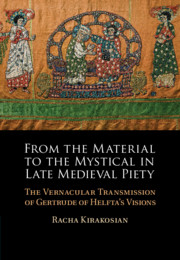3 results
5 - The Imperial, Global (Cosmopolitan) Dimensions of Nonelite Colonial Scribal Cultures in the Early Modern Iberian Atlantic
-
-
- Book:
- Cosmopolitanism and the Enlightenment
- Published online:
- 16 March 2023
- Print publication:
- 23 March 2023, pp 144-176
-
- Chapter
- Export citation

From the Material to the Mystical in Late Medieval Piety
- The Vernacular Transmission of Gertrude of Helfta's Visions
-
- Published online:
- 01 September 2021
- Print publication:
- 30 September 2021
Chapter 4 - The Scholar and the Poet
- from Part I - Contexts
-
-
- Book:
- Gods and Mortals in Early Greek and Near Eastern Mythology
- Published online:
- 27 March 2021
- Print publication:
- 06 May 2021, pp 80-106
-
- Chapter
- Export citation

